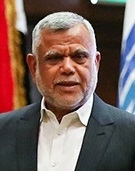Related Research Articles

Saddam Hussein Abd al-Majid al-Tikriti was an Iraqi politician who served as the fifth President of Iraq from 16 July 1979 until 9 April 2003. A leading member of the revolutionary Arab Socialist Ba'ath Party, and later, the Baghdad-based Ba'ath Party and its regional organization, the Iraqi Ba'ath Party—which espoused Ba'athism, a mix of Arab nationalism and Arab socialism—Saddam played a key role in the 1968 coup that brought the party to power in Iraq.

Yves Henri Donat Mathieu-Saint-Laurent, often referred to as Yves Saint-Laurent, was a French fashion designer who, in 1961, founded his eponymous fashion label. He is regarded as being among the foremost fashion designers of the twentieth century. In 1985, Caroline Milbank wrote, "The most consistently celebrated and influential designer of the past twenty-five years, Yves Saint Laurent can be credited with both spurring the couture's rise from its 1960s ashes and with finally rendering ready-to-wear reputable." He developed his style to accommodate the changes in fashion during that period. He approached his aesthetic from a different perspective by helping women find confidence by looking both comfortable and elegant at the same time. He is also credited with having introduced the "Le Smoking" tuxedo suit for women and was known for his use of non-European cultural references, and diverse models.

The United Service Organizations Inc. (USO) is an American nonprofit-charitable corporation that provides live entertainment, such as comedians, actors and musicians, social facilities, and other programs to members of the United States Armed Forces and their families. Since 1941, it has worked in partnership with the Department of War, and later with the Department of Defense (DoD), relying heavily on private contributions and on funds, goods, and services from various corporate and individual donors. Although it is congressionally-chartered, it is not a government agency.

Giorgio Armani is an Italian fashion designer. He first came to notice, working for Cerruti and then for many others, including Allegri, Bagutta and Hilton. He formed his company, Armani, in 1975, which eventually diversified into music, sport and luxury hotels. By 2001 Armani was acclaimed as the most successful designer of Italian origin, and is credited with pioneering red-carpet fashion. While in 2010, he opened the Armani Hotel in Burj Khalifa, the world's tallest building. He is also the richest openly LGBT person in the world. In the world of fashion he is influential to top name brands.

During the early stages of the Iraq War, members of the United States Army and the CIA committed a series of human rights violations and war crimes against detainees in the Abu Ghraib prison in Iraq, including physical and sexual abuse, torture, rape, sodomy, and murder. The abuses came to public attention with the publication of photographs of the abuse by CBS News in April 2004. The incidents caused shock and outrage, receiving widespread condemnation within the United States and internationally.

Jama'at al-Tawhid wal-Jihad, which may be abbreviated as JTJ or Jama'at, was a militant Jihadist group. It was founded in Jordan in 1999 and was led by Jordanian national Abu Musab al-Zarqawi for the entirety of its existence. During the Iraqi insurgency (2003–11), the group became a decentralized network with foreign fighters and a considerable Iraqi membership.
Balenciaga is a luxury fashion house founded in 1917 by Spanish designer Cristóbal Balenciaga in San Sebastián, Spain and currently based in Paris. Balenciaga had a reputation as a couturier of uncompromising standards and was referred to as "the master of us all" by Christian Dior. His bubble skirts and odd, feminine, yet "modernistic" silhouettes became the trademarks of the house. Balenciaga closed in 1972 and was reopened under new ownership in 1986. The brand is now owned by the French multinational holding company Kering.

The trial of Saddam Hussein was the trial of the deposed President of Iraq Saddam Hussein by the Iraqi Interim Government for crimes against humanity during his time in office.

Hadi al-Amiri is the head and secretary general of the Badr Organization, a Shiite organization based in Iraq, he heads the Shiite political organization Badr and his armed group, the Badr Brigade.

History of fashion design refers specifically to the development of the purpose and intention behind garments, shoes and accessories, and their design and construction. The modern industry, based around firms or fashion houses run by individual designers, started in the 19th century with Charles Frederick Worth who, beginning in 1858, was the first designer to have his label sewn into the garments he created.

A fashion show is an event put on by a fashion designer to showcase their upcoming line of clothing and/or accessories during Fashion Week. Fashion shows debut every season, particularly the Spring/Summer and Fall/Winter seasons. This is where the latest fashion trends are made. The two most influential fashion weeks are Paris Fashion Week and New York Fashion Week, which are both semiannual events. The Milan, London and Berlin fashion weeks are also of global importance.

Abu Musab al-Zarqawi, born Ahmad Fadeel al-Nazal al-Khalayleh, was a Jordanian jihadist who ran a terrorist training camp in Afghanistan. He became known after going to Iraq and being responsible for a series of bombings, beheadings, and attacks during the Iraq War, reportedly "turning an insurgency against US troops" in Iraq "into a Shia–Sunni civil war". He was sometimes known by his supporters as the "Sheikh of the slaughterers".

Fashion design is the art of applying design, aesthetics, clothing construction and natural beauty to clothing and its accessories. It is influenced by culture and different trends, and has varied over time and place.
Project Runway Middle East, is the Arabian version of the successful American reality TV show Project Runway. The show premiered on September 4, 2016 on MBC Group. The show features 12 Arabian designers who compete to become "the next big Arab designer". The contestants compete with each other to create the best clothes and are restricted in time, materials and theme. Their designs are judged, and one or more designers are eliminated each week. During each season, selected competitors are progressively eliminated based on the judges' scores until only a few contestants remain; these finalists prepare a complete fashion collection, from which a winner is determined. Each episode welcomes a celebrity guest judge that will contribute in the decision making.

A suicide car bombing occurred on 17 July 2015 in the Iraqi city of Khan Bani Saad, targeting a local marketplace. As of 19 July 2015 approximately 130 people were killed in the bombing, with a similar number of injured. Several people were killed by collapsed buildings. The bomb was hidden under an ice truck in an attempt to attract more people amid the heat. Responsibility for the attack was claimed by the Islamic State of Iraq and the Levant (ISIL).

The keffiyeh or kufiya also known as a ghutrah (غُترَة), shemagh, ḥaṭṭah (حَطَّة) or mashadah (مَشَدَة), is a traditional Arabian headdress, or what is sometimes called a habit, that originated in the Arabian Peninsula, and is now worn throughout the Middle East region. It is fashioned from a square scarf, and is usually made of cotton. The keffiyeh is commonly found in arid regions, as it provides protection from sunburn, dust and sand. Toward the end of the 1980s, the keffiyeh became a fashion accessory in the United States and, during the early 2000s it became very popular among teenagers in Tokyo, Japan, where it is often worn with camouflage-style clothing.
Amer al-Obaidi is an Iraqi-born painter, now residing in the United States, who is noted for artwork that emphasises Iraqi folklore and tradition.
Salim al-Dabbagh is an Iraqi painter and installation artist noted for abstract work that references Iraqi traditions. He was one of the founders of the Innovationists Group; an artists' collective that helped to shape modern art in Iraq and was the Head of the Graphic Department at the Institute of Fine Arts in Baghdad from 1971 to 2000.